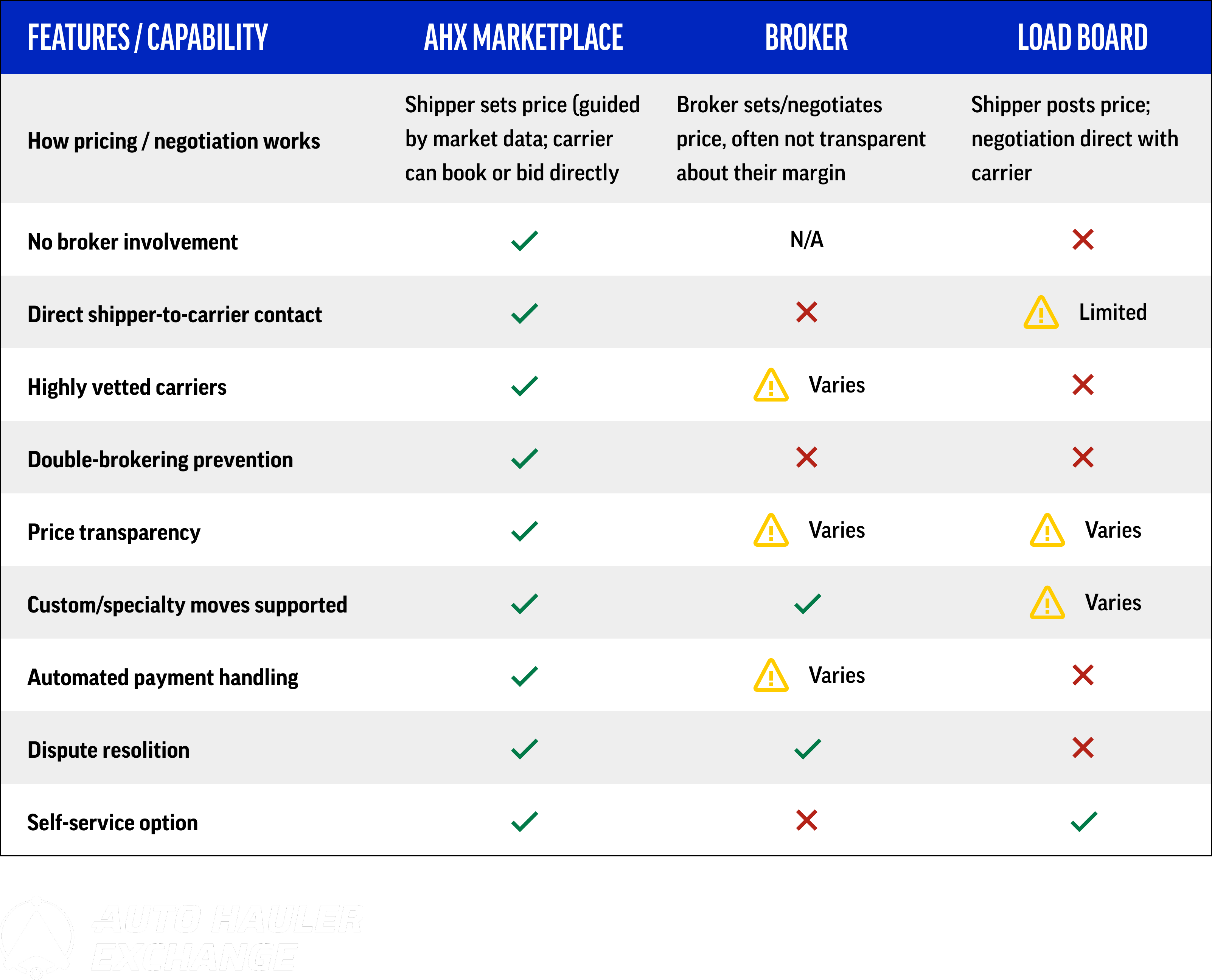Shipping a vehicle has never offered more choices…or more confusion.
Should you use a digital marketplace, call a broker, or post your move on a load board? The truth: Each model has real strengths, weaknesses, and features that could make or break your next move.
This comparison skips the hype and focuses on features that actually matter so you can make a confident, informed decision for your business.
Three Options to Connect Shippers and Carriers
Today, there are three primary ways for shippers to find carriers, and for carriers to find work. Each method comes with its own advantages, limitations, and risks. Before we compare them, let’s define what each one actually is and how it fits into the broader vehicle-logistics landscape.
What Is a Broker?
A broker is a middle party that sits between the shipper and the carrier. Their role is to find a carrier on the shipper’s behalf, negotiate the price, and coordinate the shipment. While brokers can save shippers the headache of logistics, they also introduce additional cost and time with little transparency.
What Is a Load Board?
A load board is an online directory where shippers, brokers, and carriers post available shipments or available equipment. Load boards offer massive volume and flexibility, allowing carriers to pick and choose shipments that match their preferred lanes.
However, load boards come with tradeoffs: shippers must do their own carrier vetting, pricing can be volatile, and fraud risk is higher. Carriers, on the other hand, often encounter heavy competition that pushes rates downward, especially in oversupplied markets.
Check out this full guide to load boards.
What Is an Auto Hauler Marketplace?
An auto hauler marketplace, like Auto Hauler Exchange (AHX), is a relatively new method that connects shippers and carriers directly, without a broker in the middle. Unlike load boards, marketplaces pre-vet their carrier networks, monitor insurance and compliance, and provide transparent pricing. Shippers set the offer price themselves, and carriers accept it with full visibility into what they’ll earn.
This model removes hidden broker margins, reduces dwell time, and increases communication efficiency.
Marketplace vs Load Board vs Broker: Key Features
Now that you’re familiar with each method, let’s get right into the key differences between marketplaces, load boards, and brokers.
Pricing and Negotiation
With a marketplace like AHX, shippers set the prices themselves, often using a market data tool for guidance. Carriers can book the load at the listed price or submit a counteroffer, which helps keep negotiations quick, visible, and efficient. This approach removes the uncertainty of endless phone calls or hidden back-and-forth.
Brokers handle pricing largely behind the scenes. They may negotiate with carriers on your behalf and then present you with a final rate. While some brokers offer transparency about pricing, most don’t, so you’re often relying on their process and level of disclosure.
On a load board, shippers post the price directly. Carriers can reach out to negotiate, accept, or make an offer. Keep in mind, brokers are also on load boards, so you may not be working directly with a carrier. That means managing each negotiation yourself.
Carrier Vetting
Marketplaces take responsibility for vetting every carrier, ensuring compliance, insurance, and professional reputation before allowing them on the platform. They also prohibit double brokering, so the carrier you book is the one actually moving your vehicle.
With brokers, the level of carrier vetting can vary. Some maintain high standards and thorough checks, while others may be less diligent. The problem is, you never know what you're going to get. Double brokering—when your shipment is handed off again without your knowledge—is more common and riskier in this model.
Load boards typically leave vetting up to the shipper. Anyone can claim a load, so you must do your own research to confirm credentials. Double brokering is a known risk, with fewer protections in place. Because of the lack of guardrails, we often hear our customers describing load boards as the Wild West.
Payment and Dispute Handling
In the marketplace model, all payments are managed through the platform. This ensures that carriers get paid promptly and that shippers have a clear process for recourse if any issues arise.
Brokers may also handle payments, but the process, timing, and level of protection can vary significantly from one broker to another.
On a load board, payments are arranged directly between the shipper and carrier. There’s little regulation, which can lead to delayed or missed payments. There’s also the possibility of price changes upon delivery, and rarely is there a neutral party to help resolve disputes.
Custom and Specialty Moves
Marketplaces excel at handling routine, standard vehicle shipments. And, because there are thousands of carriers on the platform, they’re able to handle unusual cases such as non-running vehicles, heavy equipment, or highly specialized lanes.
While brokers can coordinate custom or unusual moves, these shipments often mean more steps, longer timelines, and higher costs for the shipper. Because brokers have to track down specialized carriers and manage extra logistics, the process is typically slower and less predictable than booking a routine load through a marketplace. Shippers should also expect to pay a premium, as brokers pass along the higher carrier costs and additional effort required.
Load boards can also be used for specialty loads if you’re able to find the right carrier yourself, but the responsibility for vetting and negotiation falls entirely on you.

What’s The Difference Between an Auto Transport Marketplace and a Broker?
At Auto Hauler Exchange, one of the most common questions we hear is: “How is a marketplace any different from a broker?”
It’s a fair question — marketplaces are still relatively new in the vehicle-logistics world, and because both models connect shippers and carriers, they can look similar on the surface. But the differences between them are fundamental, and they have a major impact on cost, transparency, and control.
A broker sits between the shipper and the carrier. They negotiate pricing, choose the carrier, and relay information back and forth. Because brokers aren’t required to disclose what they’re paying the carrier, the shipper often has no visibility into the true cost of the shipment.
A marketplace like AHX, on the other hand, isn’t a person, it’s a platform. The marketplace handles all the vetting in the background, but the shipper and carrier communicate directly. Pricing is fully transparent, and the shipper sets the offer themselves. There’s no one in the middle reshaping rates or controlling the interaction.
- Brokers: Act as an opaque connector, decide which carrier to use, and pocket an undisclosed margin on the shipment.
- Marketplaces (like AHX): Facilitate the logistics and vetting, but let shippers and carriers work directly. Both sides see the exact amount paid and earned.
A Real-World Example: AHX Kicked Off Central Dispatch
A perfect example to highlight the difference between a broker and a marketplace is AHX’s recent exit from Central Dispatch. For a while, AHX appeared on Central Dispatch with a broker designation, even though we aren’t a broker. We pushed to have our classification changed to “marketplace”, but the platform doesn’t have an accurate category for the marketplace model.
Since AHX is the only true auto-hauler marketplace, there wasn’t a box for us to fit into… and ultimately, we were removed. You can watch a quick explanation below:
Marketplaces Are Disrupting the Traditional Brokerage Model
Marketplaces are transforming vehicle logistics by giving shippers and carriers what brokers can’t: direct communication, transparent pricing, faster turnaround times, and a more efficient way to move vehicles. As the industry evolves, marketplaces like AHX are leading the shift away from opaque broker-driven processes and toward a more open, data-driven, and carrier-friendly model.
How to Choose The Right Model for You
Now that you understand the differences between each vehicle-logistics model, let’s go deeper into how to choose the best one for your business. When deciding on an approach, consider the questions below, along with what matters most to your operation.
Questions for Shippers to Consider
Do I have an existing relationship with a broker whom I trust?
If you already have a strong relationship with a broker and that connection is important to you, you may choose to maintain it. But remember: our founder spent decades in the brokerage world and built AHX specifically because shippers deserved better pricing, better transparency, and better control.
Do I enjoy hunting for deals and doing my own haggling?
Some shippers like working the phones, negotiating rates, and managing the back-and-forth themselves. In this case, you might consider a load board. If that’s not your style, the Exchange streamlines everything. You set your offer once, and vetted carriers come directly to you, without a broker shaping the price behind the scenes.
Do I have the time and knowledge to vet carriers on my own?
If you do, a load board might fit your needs. But if you prefer someone else to track insurance, compliance, and carrier reliability, AHX or a reputable broker can reduce your operational burden. Keep in mind, even with brokers, there’s still a risk of fraud, so diligence is always essential. AHX removes much of that risk with 5,000+ vetted carriers.
How much time am I willing to wait for my vehicle to be delivered?
Nearly half of shippers expect their vehicles to be delivered in four days or less. Yes, 34% of shippers still cite speed as a major pain point. If speed matters, AHX delivers fast. Vehicles average 1 day to book, 2 days from ordered to pickup, and 4 days from listed to delivered. Working through a broker often adds time because there’s another party in the middle. But if speed isn’t a priority and you’re comfortable with longer timelines, traditional approaches may still work for you.
Questions for Carriers to Consider
Am I prioritizing quantity or quality?
If you’re early in your business and focused on building volume, a traditional load board may offer the widest range of opportunities. But if you’re shifting toward higher-quality shipments, faster payouts, and long-term relationships with shippers you trust, AHX lets you connect directly with vetted shippers.
What’s the purpose of the vehicle haul?
If you're trying to fill a backhaul, tighten your route, or eliminate empty miles, you may want access to as many postings as possible. Load boards can help, but keep in mind that you’re responsible for negotiating every detail, vetting each shipper, and protecting yourself from payment issues.
Do I care about how much of the cost is going to brokers?
If broker cuts are impacting your profitability, AHX gives you full transparency. You see exactly what the shipper pays and exactly what you earn.
Choosing the Model That Moves Your Business Forward
The vehicle-logistics world is changing fast. Shippers and carriers have more options than ever, but more choice doesn’t mean more clarity. Brokers offer convenience, but at the cost of transparency. Load boards offer volume, but leave you managing risk, negotiation, and vetting on your own.
Marketplaces combine the best parts of each model while removing the problems created by the broker layer. By connecting shippers and carriers directly, AHX delivers the speed, transparency, and efficiency that today’s operations demand. With vetted carriers, clear pricing, and automated payment handling, the Exchange helps both sides move vehicles with confidence.
At the end of the day, the right choice depends on what matters most to your business: cost control, communication, delivery speed, and carrier quality are some key considerations.
When you’re ready for a simpler, more transparent way to move vehicles, the Exchange is here. Book your next shipment on Auto Hauler Exchange and experience how direct connections can transform your logistics.
.png)
.png)
.png)
.png)

.png)
